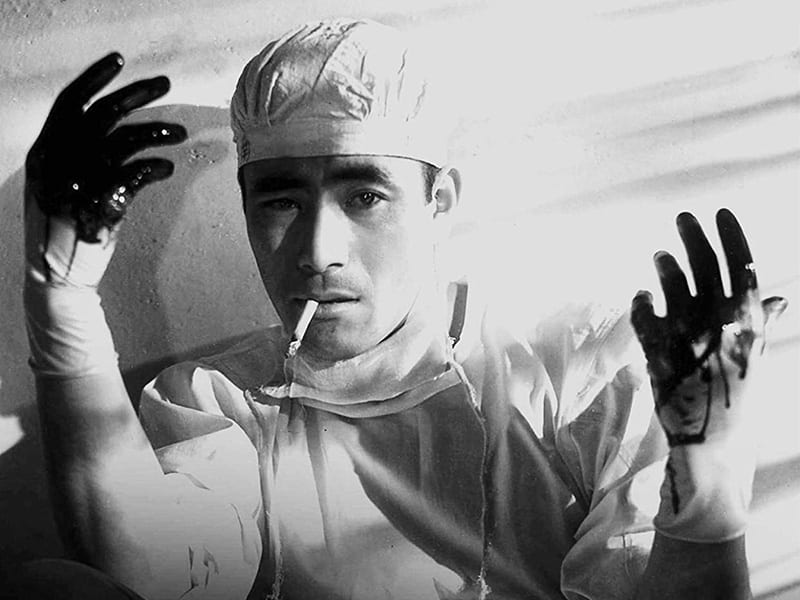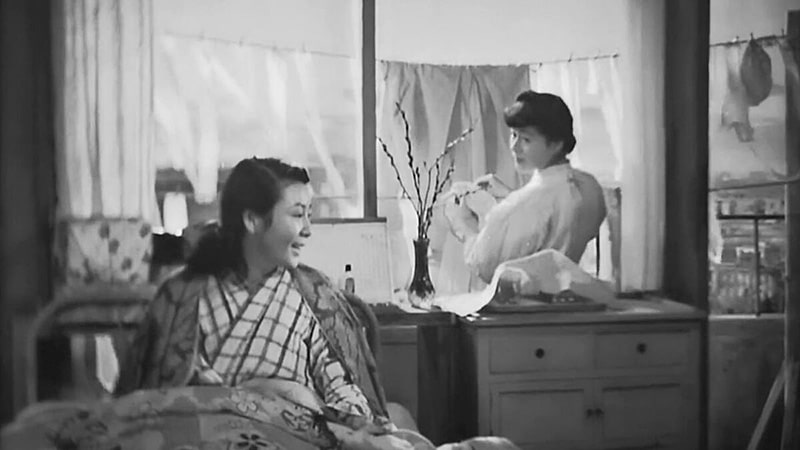The Quiet Duel (1949)
The Quiet Duel is a morality tale about a good man coming to terms with fleshly passions. The titular “duel” is that between a young doctor’s moral equilibrium and the desires of his heart, even those most identifiable and seemingly noble. In only his second collaboration with Akira Kurosawa, Toshiro Mifune plays a wartime surgeon, Dr. Kyoji Fujisaki, whose clinical understanding of humanity is given a crash course.
Having spent his tour of duty stitching together soldiers broken by modern warfare, as well as attending to their carnal indiscretions, Kyoji is all too cognizant of the repercussions of vice. He has hitherto protected his emotions by remaining clinically detached. But when he contracts syphilis through exposure to a patient’s blood, he no longer has the luxury of considering such matters through a microscope; to remain true to his ideals now requires dire sacrifice.
As a syphilitic, he feels that he can no longer marry the woman he loves, she who has long been the object of his ascetic meditations during wartime, the prize he would claim for staying true to his work and keeping from soldierly distractions. Now, after the war, because he cannot bear the thought of infecting her or bringing himself to confess his shame, she becomes to him a kind of temptress. The innocent love that had been his comfort now can only torment him.

A series of interwoven subplots add texture to Kyoji’s dilemma. Nakada, the man with the infectious blood, figures thematically as a baser version of Kyoji; Nakada represents all that Kyoji would like to do, and Nakada’s bad end demonstrates the dangers that would seem to issue from such unruly behavior. The past indiscretions of Nurse Minegishi — who earlier in the film has become pregnant out of wedlock and is in despair, only to find inspiration in Kyoji — and are given an example in Kyoji’s selflessness; the pathos of his situation has a restorative effect on her character, such that she nurses a fiercely loyal affection for him, even hoping that once his illness has been healed, that he might reciprocate the feelings that she has for him.
Finally Kyoji’s betrothed, Misao Matsumotu, complicates the doctor’s dilemma by remaining faithful even when given little reason. Kyoji would not have Misao wait an inordinate time for his illness to heal and, thus, keeps her in the dark on the finer points of his reasoning, perhaps hoping his unfairness will make the break somewhat easier for her. Her steadfastness to him becomes his worst temptation and, in fact, makes the audience question Kyoji’s prudence in holding her at bay.
The scenes in which Misao pleads her former intended to open his heart to her are among the most moving of the film; they crystallize every aspect of his plight, the moral imperative that stalks him, and the temptation that seems so prudent, so life-affirming. She eventually marries someone else after his absolute declaration that they cannot marry, but even so each retains an obvious affection for the other.

The film’s dwelling on the social implications of illness is evocative of the class anxieties of the time in which it was made. The sexual component accompanying the contraction of syphilis brings with it designations of poverty and, superficially, the mores of the lower class. As an educated professional, Kyoji should be “above” such considerations, but the hazards of his occupation put him at risk. Ironically, in his willingness to care for the wounds of those of a lower station, he threatens his own. Taking the moral high road has opened him up to castigation on moral grounds.
The most telling line in the film, perhaps, is that spoken by the young doctor in confessing his infection to his father: “I tried to think of the worst disease… And it was the one I had.” In characterizing the source of the infection as a self-fulfilling prophecy, Kyoji traces his illness back to paranoiac roots. — Nathan Pensky

